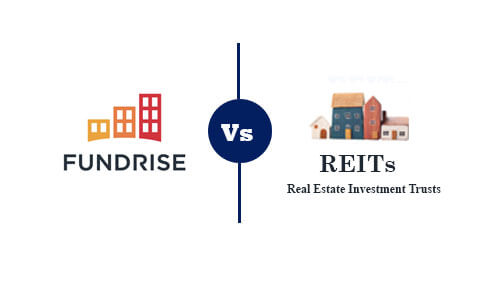Real estate isn’t just for hedge funds and millionaires anymore. Every day new options for the average Joe to enter the real estate game pop up. Two of the most popular are also on different ends of the public spectrum: real estate investment trusts, or REITs, are publicly traded like stocks and represent equity in firms that manage real estate. Fundrise, a private investment company, manages a series of proprietary REITs for you based on income level, risk tolerance, and investing goals.
Let’s look at how they compare.
Fundrise
Fundrise is one of the most accessible services available to the everyday investor without a ton of capital looking to enter the real estate game.
Fundrise emphasizes investment in their own in-house REITs and offers four tiers of membership plans based on investing goals: starter, supplementary income, balanced investing, and long-term growth. The titles speak for themselves and describe the focus of the proprietary REIT you’ll be investing in.
Accessibility
Fundrise is provides great accessibility, although less so than REITs traded through normal brokerages. You don’t need hundreds of thousands of dollars to invest in real estate, nor do you need to take a high-interest rate loan out (like a mortgage in today’s Federal Reserve exponential rate increase environment).
Instead, you can get started with an account balance as low as $10 for the starter option. Additionally, fees are capped at 1% annually (0.85% management plus 0.15% advisory). This is very low for private equity fee structuring, although there are additional small fees if you withdraw money before agreed-upon exit windows.
In addition to the basic cost of capital, Fundrise’s platform and tier/strategy structure are intuitive and easy to navigate, especially as you learn how the real estate sector works.
Returns
Not only has the overall real estate market skyrocketed over recent years, but Fundrise has a long-term average (amongst all tiers) return in the 11% range. This return is fantastic and is especially important to offset coming stock market losses with more tangible equities and less sensitivity to stock problems.
Downsides
What are some of the downsides?
- Market Risk. This isn’t just applicable to Fundrise – as we saw in 2008, the real estate market isn’t impenetrable, and crashes can still happen. Luckily, post-crisis legislation and regulation have helped mitigate the potential of future issues like we saw in 2008.
- This is a benefit we mentioned, but although baseline fees are meager, there can be complicated fee and penalty structures if you elect to withdraw money before the expiration window you agree to when investing. It’s always important to read whatever agreement you sign when investing with a new service, but the complex structure of Fundrise contingency fees amplifies the importance.
REITs
Real estate investment trusts, or REITs, are broad, publicly-available equities that represent a firm’s stake in income-generating real estate. Think condos, malls, resorts, whatever – tons of REIT options are available.
Cost of Capital
Since REITs are traded like stocks, they have many of the same benefits and downsides. For example, when looking for an initial investment, you will be required to invest a minimum of the price of one share – which can range from $100 to $1000+, compared to Fundrise’s minimum investment requirement ($10).
More Work for You
You will also have to do your due diligence when selecting the REITs you invest in. You’ll need to determine and manage risk profile, risk-adjusted returns, management fees, and costs – the list is endless. Compare this to Fundrise’s wholly managed, diversified, and risk-adjusted offerings with transparent baseline fees.
Most REITs also focus on cash flow generation through tenancy and financing, compared to Fundrise’s additional capital appreciation goals.
Returns
Like Fundrise, REITs have solid returns. They also have the advantage of a longer collective time horizon, as REITs have been around for decades – the REIT sector has returned 11.51% over the past four decades, which is a strong showing. While this does appear to beat Fundrise, we must remember that Fundrise, as a firm, is newer than the collective REIT market, and its long-term outlook means that they are necessarily slower to start over the first few years.



